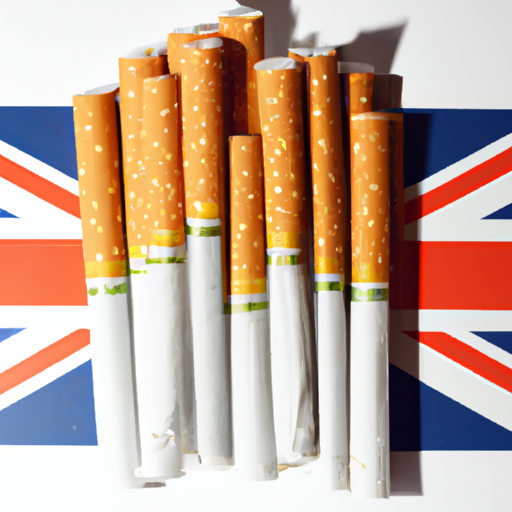
As a resident of the UK, I have been surrounded by cigarettes for most of my life. They’re everywhere – from the corner shop to the pubs and even at the entrance of the supermarket. I’ve seen friends, family members, and strangers lighting up and puffing away, oblivious to the dangerous habit they have picked up.
Despite the efforts of the government to reduce smoking rates, cigarettes are still prevalent in the UK. In this article, I will delve into the world of cigarettes in the UK, discussing their history, popularity, and the effects they have on individuals and society as a whole.
History
Cigarettes have been around for centuries, but it wasn’t until the 19th century that they became popular in the UK. The first cigarettes were brought to England by Spanish and Portuguese sailors in the late 1600s, and they were primarily used for medicinal purposes.
It wasn’t until the 1800s that cigarettes were mass-produced and marketed for their recreational effects. One of the first cigarette factories in the UK was established in 1832 by Thomas Harrison in Nottingham. The cigarettes produced at this factory were hand-rolled and were known as “Turkish” cigarettes.
In 1884, the first patent for a cigarette-making machine was granted to James Albert Bonsack in the US, which revolutionized the production of cigarettes around the world. By the turn of the 20th century, cigarettes had become a popular commodity in the UK, especially among soldiers who brought the habit back from the war.
Popularity
According to the latest statistics from the Office for National Statistics, 14.7% of adults in the UK smoke, which equates to about 6.9 million people. Despite the decline in smoking rates over the years, it’s still a significant number, and it has remained relatively stable for the past decade.
Cigarette use is more prevalent among men than women, with 16.8% of men smoking compared to 12.7% of women. Additionally, smoking is more prevalent among younger adults, with 16.6% of 25-34-year-olds smoking compared to 6.5% of those over 65.
But why is smoking still so popular in the UK despite the well-known health risks? Some believe it’s due to the addictive nature of nicotine, while others argue it’s due to the social aspect of smoking. No matter the reason, it’s clear that quitting smoking is not as easy as it seems, and many smokers struggle with addiction.
Effects on Individuals and Society
Cigarettes have detrimental effects on both individuals and society as a whole. Most people are aware of the long-term health consequences of smoking, such as an increased risk of lung cancer, heart disease, and stroke. However, there are also immediate effects of smoking that are often overlooked.
Smokers are more likely to develop respiratory issues such as asthma, bronchitis, and chronic obstructive pulmonary disease (COPD). They also have a higher risk of developing tooth and gum problems, as well as skin issues such as premature aging and wrinkles.
Aside from the health effects, smoking also has a significant impact on society. The NHS spends an estimated £2.5 billion per year treating smoking-related illnesses, and the economic costs of smoking, including lost productivity and early retirements, can add up to an additional £13 billion.
Furthermore, smoking is a burden on the environment. Cigarette smoke is harmful to both humans and the ecosystem, and cigarette butts are the most littered item in the world. Not only do they take years to decompose, but they also release toxic chemicals into the environment, polluting our waterways and harming wildlife.
Government Efforts to Reduce Smoking Rates
The UK government has implemented various measures to tackle smoking and reduce the number of people lighting up. These include increasing the legal age for purchasing cigarettes from 16 to 18 in 2007, banning smoking in enclosed public places in 2007, and introducing graphic warning labels on cigarette packages in 2008.
In 2012, the government implemented a plan to create a “smoke-free” generation by 2030. This plan includes measures such as introducing standardised packaging for cigarettes, banning packs of 10 cigarettes, and launching anti-smoking campaigns.
In 2020, a ban on menthol and flavoured cigarettes was also introduced, as these have been found to attract younger smokers. While these measures have had some success in reducing smoking rates, there is still a long way to go until the UK becomes smoke-free.
The Cost of Smoking
Aside from the obvious health consequences, smoking also has a significant financial impact on individuals. The average price of a pack of cigarettes in the UK is around £11.50, which can add up to a substantial amount for regular smokers. Not to mention the cost of lighters, ashtrays, and other smoking accessories.
In addition to the cost of purchasing cigarettes, there are also hidden costs associated with smoking. These include higher health insurance premiums, higher life insurance rates, and potential lost wages due to sick days or early retirement from smoking-related illnesses.
Quitting Smoking
Quitting smoking is no easy feat, but it is possible. There are many options available for those looking to kick the habit, including nicotine replacement therapy, prescription medications, and counselling. The NHS also offers a free stop smoking service, which provides support and resources for those looking to quit.
Aside from the health benefits, quitting smoking can also have a positive impact on an individual’s finances. Not only will there be immediate savings from not purchasing cigarettes, but there will also be long-term financial benefits from improved health and potentially lower insurance rates.
In Conclusion
Cigarettes have been a part of UK culture for centuries, but their popularity and prevalence are slowly declining. Smoking has detrimental effects on individuals, society, and the environment, and the government has implemented various measures to reduce smoking rates. While quitting smoking may seem like a daunting task, the benefits far outweigh the challenge, both for an individual’s health and their wallet. So, if you’re a smoker, I urge you to consider the consequences and take steps towards a smoke-free future.